1890s
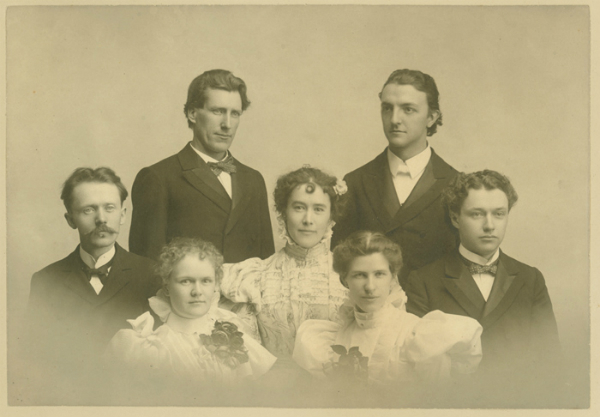 Photo credit: Ithaca College Archives
Photo credit: Ithaca College Archives
1892
With a faculty of eight teachers and two lecturers, W. Grant Egbert opens the Ithaca Conservatory of Music in four rooms of a house at 403 East Seneca Street.
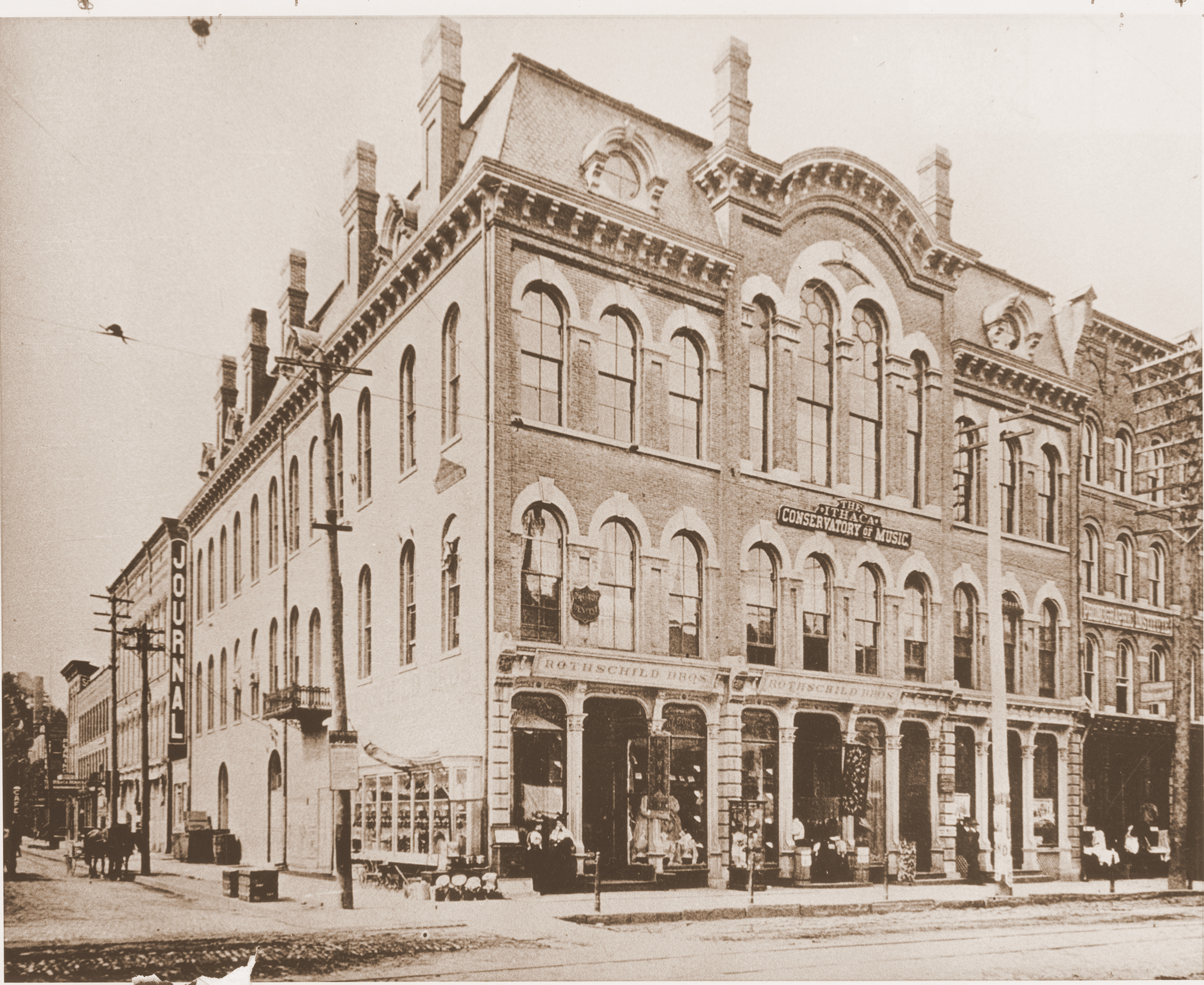 Photo credit: Unknown
Photo credit: Unknown
1894
The conservatory finds a new home at the Wilgus Opera House at the intersection of State and Tioga.
1895
The upstart conservatory reaches an agreement with Cornell University to direct its musical work, including the cadet band, symphony orchestra, and music at Sage Chapel, plus a series of lectures in music appreciation.
1897
The conservatory holds its first Commencement, with a grand total of two students graduating — pianists M. Ethel Nichols and Kate Green.
1900s
1900
For the first time, an estimate of the cost of tuition, board, room, and all expenses is provided: $475 for a full course.
1900
The Conservatory Home for Lady Students opens at 312 North Geneva Street. Mrs. Esther B. Egbert, the mother of Grant Egbert, serves as preceptress. "At a cost from $5 to $7 a week, the management will assume full responsibility for the mental, moral and physical development of its lady students."
1901
Key Note, the conservatory's first magazine, is created.
1901
A School of Opera is established at the conservatory.
1903
The conservatory is left practically bankrupt after a grim typhoid fever epidemic devastates the city just before the start of spring term. All students rush for their homes and all public gatherings are forbidden.
1903
Egbert takes a leave of absence in order to attempt to win back his wife, who had left him and gone to Europe.
1903
The first sorority, Alpha Tau, is established. (It would later be known as Sigma Alpha Iota.)
1903
The link with Cornell University is severed, leaving George Williams to worry that the conservatory missed the opportunity to become an associated school with the university.
1904
The school's original alma mater, "Ithaca, Thou Lovely City," is written.
1908
George Williams announces a $1,300 deficit and launches his "Cooperative Plan," in which principal teachers (Williams, Mr. and Mrs. Eric Dudley, Stanley Olmstead, Linwood D. Scriven, and Egbert, upon his return) are responsible for the financial success of the school.
1909
A whopping 12 students graduate at the 17th annual Commencement.
1909
Herbert to the rescue! Herbert Hilliard, former director of the piano department, returns to the school and buys a 4% interest in the cooperative, enough to pay off the school's debts.
1909
A student Self-Government Association (for women) is formed "to supervise the students' general behavior when outside of the conservatory and to deal with any indiscretions on the part of any student."
1910s
1910
The Institution of Public School Music is officially established. The curriculum is registered in Albany in September.
1910
The executive board begins to create a formal alumni organization.
 Photo credit: Ithaca College Archives
Photo credit: Ithaca College Archives
1912
Clarice A. Jones, the earliest known student of color, graduates.
1914
After considerable faculty outrage over "modern dancing," the directors deny the Sigma Alpha Iota sorority "the privilege of dancing the 'Hesitation Waltz' at their Annual Ball."
1914
The board of trustees is created. It is made up of the existing board of directors, the mayor of Ithaca, and four alumni representatives.
1915
While war rages in Europe, the school holds a Belgian Relief Concert in support of the local Belgian Relief Committee.
1917
Grant Egbert is reinstated as president and George Williams is elected secretary and treasurer, with full authority over conservatory funds.
1917
The "aviation boys" at Cornell are invited to conservatory dances, "whatever the moral risks."
1917
Grant Egbert's wife, Mabel Green, finds herself with a house full of students when her home becomes a makeshift infirmary during the influenza epidemic. After working day and night to care for the sick, she passed away in 1918.
1918
Concerts are held to benefit the Red Cross and aid the war effort.
1919
The faculty issues a number of restrictive decrees: No conservatory women may attend Sunday movies; women may "walk out after dinner" until 7:30 p.m. (but not on state Street); they are forbidden to seek refreshment after that hour without a chaperone or escort; they may not dine at any hotel nor attend evening movies without a chaperone; and canoeing on Lake Cayuga is "strictly forbidden." A year later, after student complaints, the directors extend the curfew to 8 p.m. with some late permissions until 10:30 p.m.
1920s
1920
After renovations, the conservatory moves to the townhouse of Judge Douglass Boardman, located at 120 East Buffalo Street in the DeWitt Park area. The Boardman building will remain the conservatory's home until the construction of South Hill campus in the early 1960s.
1921
The Ithaca School of Physical Education comes into its own when Albert H. Sharpe becomes its dean. Classes are taught in the Ithaca High School gym. Percy Field (the present site of Ithaca High School) is used for outdoor sports.
1921
Frederick Van Doren Martin establishes the Martin Institute for Speech Correction, another affiliated school. Martin Hall is located on North Tioga Street between Court and Buffalo. Martin devoted his life to speech correction after solving his own speech difficulties.
1922
Patrick Conway establishes the Ithaca School of Band Instruments. Conway has a strong national reputation and the affiliated band school is hailed as the only institution of its kind in the country. The school would be absorbed by the Department of Music Education in 1931.
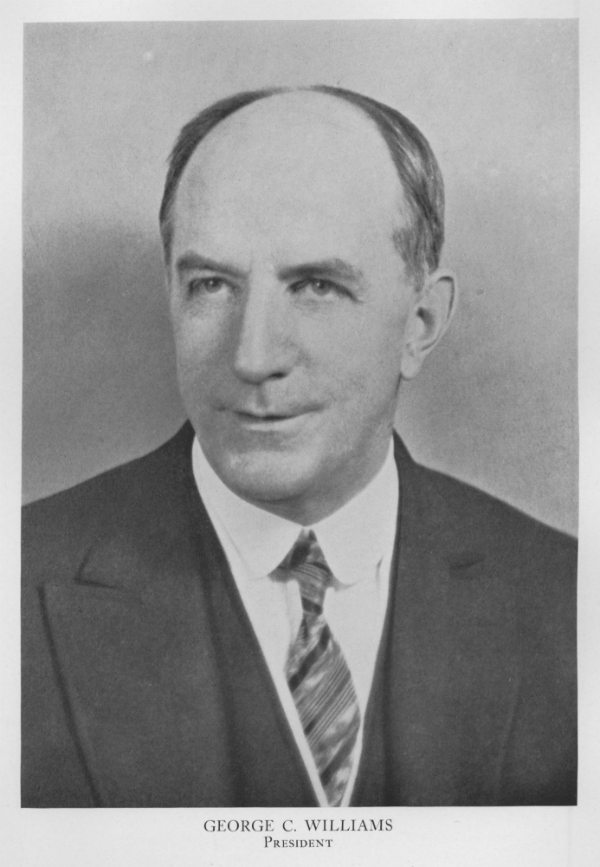 Photo credit: Ithaca College Archives
Photo credit: Ithaca College Archives
1924
Because of deteriorating health, Grant Egbert announces his resignation as president. He continues as vice president and musical director. George Williams is named president.
1926
A new charter is granted, changing the conservatory's name to the Ithaca Conservatory and Affiliated Schools and granting the institution the power to confer the following degrees: Bachelor of Music, Bachelor of Physical Education, and Bachelor of Oral English.
1926
So long, Key Note. Once-a-Week is the new campus newspaper.
1928
The school's first honor society, the Oracle Honor Society, is founded. It sponsors Scampers, an annual theatrical event in which members from each of the six fraternities on campus perform a stunt or an act.
1930s
1930
The Ithacan replaces Once-a-Week as the campus paper.
1930
IC football rules! The football team's first season includes games against Mansfield, St. Lawrence, Cortland, Hartwick, and Colgate.
1931
The soccer and baseball teams begin playing against other colleges.
1931
Ithaca College comes into being with a second charter allowing the college to confer the degree of Bachelor of Science, in conformity with the rules of the Regents of the University and the regulations of the Commissioner of Education.
1931
Leonard Bliss Job arrives as dean.
1931
Sydney Landon of the Williams School of Expression and Dramatic Art starts a course in radio which stresses program making, announcing, timing, and the use of the microphone.
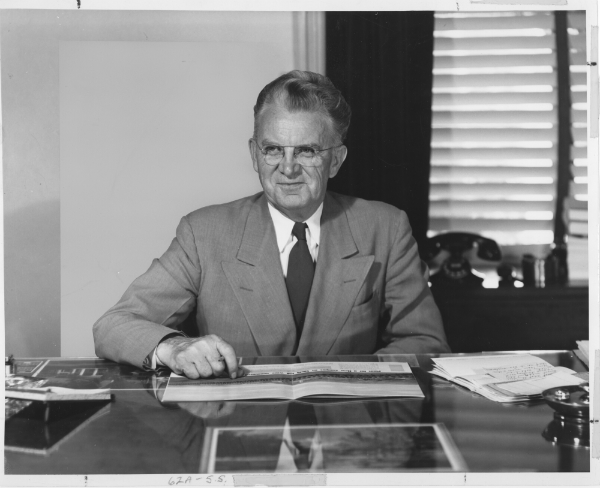 Photo credit: Ithaca College Archives
Photo credit: Ithaca College Archives
1932
After he deleted a critical page in a copy of the college's annual report that was sent to the assistant commissioner for higher and professional education in New York, the board of trustees forces George Williams to resign. Job is voted in as the new president.
1932
Ithaca "college": Unable to meet a state requirement to have a $500,000 endowment, the college salvages its ability to confer degrees by being classified as a technical and professional school (thanks to some goodwill from the State Department of Education).
1932
The Ithaca College A Capella Choir is founded.
1933
Because of the Great Depression, only 332 students register (compared to 559 just two years earlier). Salaries are cut, and cut again. With all the college's real estate already mortgaged to the hilt, the college takes out a "chattel" mortgage on the remainder of its physical possessions. In the annual report delivered to the board, Job writes: "It is hardly possible to overstate the magnitude of our financial problems ... As I view the year in retrospect, I marvel at the fact that we were able to act at all."
1933
The Ithaca College Concert Band begins performing on WESG Radio in Elmira.
1934
The Ithaca College Alumni Association forms and meets in New York City.
1934
The college opens the Tea Room on Buffalo Street as a gathering place for students. It serves students tea, coffee, and pastries.
1935
First lady Eleanor Roosevelt invites the A Cappella Choir to the White House to sing at a garden party.
1936
For the first time, the catalog lists a course in physiotherapy as an adjunct to the offerings of the Martin School of Speech Correction.
1936
Ithaca College is elected to membership in the National Intercollegiate Athletic Association.
1936
The board of trustees approves the addition of courses related to television, radio, and film to the catalog.
1936
The Oracle Honor Society, with Scampers, creates a loan fund for students in need.
1936
The Ithaca College Symphony Orchestra gives its first performance.
1937
In exchange for a pledge not to leave Ithaca, a group of local businessmen who believe that the college is an asset to the community agree to wipe $100,000 in debt off the college's books.
1937
A fire guts the music library, destroying many valuable pieces of music.
1937
The first Alumni Weekend is held.
1938
The Ithacan names the "college shag" one of the year's hottest ballroom dances.
1940s
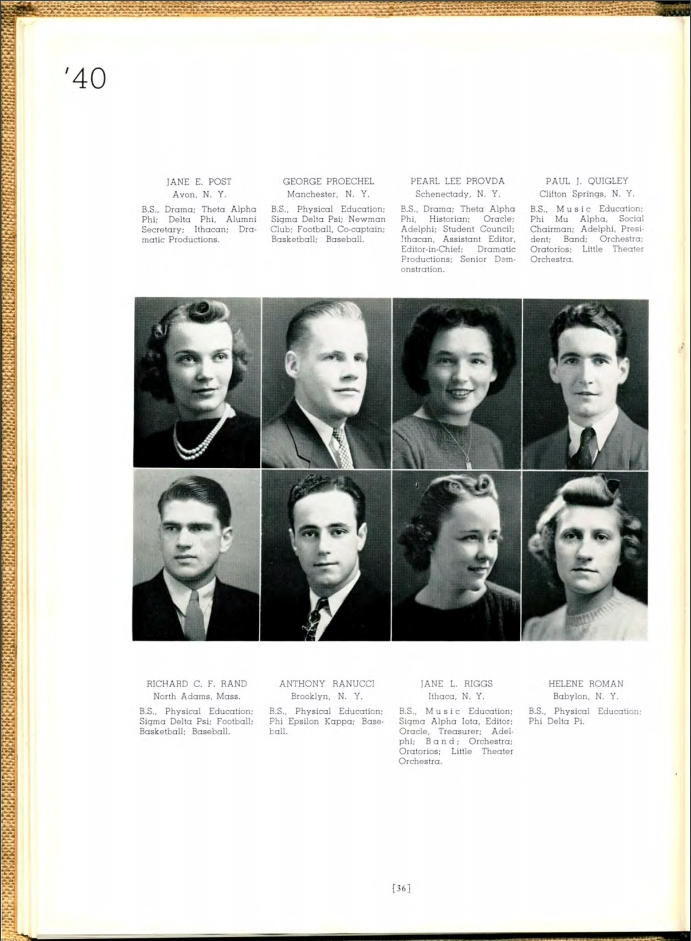 Photo credit: Ithaca College Archives
Photo credit: Ithaca College Archives
1940
Senior Pearl Lee Provda is the first woman to serve as The Ithacan's editor-in-chief.
1940
While a 1936 contest to name the college's athletic teams settled on the "Cayugas," a local sportswriter and member of the publicity staff begins using the name "Bombers" in his own stories, and the name sticks.
1942
In response to World War II, the college adopts an accelerated calendar program, squeezing three semesters of work into one year.
1942
Because of the war, the student council decides to ban "hell week" hazing of freshmen.
1942
The college is selected by the U.S. Army for a clinical trial of the flu vaccine.
1942
World War II leads to a significant decline in enrollment. Job says that "It is difficult to anticipate any result other than the closing of the college for the duration, should all able-bodied men withdraw from college."
1943
Only 225 students are registered, 51 men and 174 women. The statistics for 1944 are only slightly better.
1943
The Ithacan urges students to conserve the coal used to heat dormitories.
1943
Captain John Brady, an IC student serving in World War II, starts a band in a German prison camp. Students in Ithaca perform for local servicemen.
1943
The college gains the ability to confer the Master of Science, the Master of Fine Arts, and the Master of Music.
1945
The board of trustees directs President Job to organize a School of Physiotherapy with a four year curriculum, said to be the first in the United States. Two years of this program will be spent in Ithaca; two in New York City.
1945
The college purchases the Williams Practical Business School on North Tioga Street. The Ithaca College "School of Business" commences operations in September 1945. The first-year curriculum is a one-year program in secretarial sciences.
1946
In need of more room, President Job tries unsuccessfully to move the college first to Utica, and then to an abandoned army camp at Sackets Harbor on Lake Ontario.
1946
In the wake of the war, students organize political discussion groups.
1947
Ithaca College is the first to win approval from the State Department of Education to train students for licensing examinations as physiotherapists. Expanded course offerings in Ithaca make it possible to reduce the period of training in New York City to only the senior year. From modest beginnings in a speech correction program, physiotherapy becomes a full-scale division within the School of Health and Physical Education.
1947
With the return of GIs from World War II, enrollment skyrockets to 1,444.
1948
Due to the income generated by the post-war increase in students, the college's indebtedness is reduced to zero for the first time in its almost 60 years of operation.
1949
The board authorizes the purchase of land on South Hill and plans for the college to leave the Ithaca area cease. Chamber of Commerce President Claude L. Kulp says, "It is gratifying to know that this institution of which we are very proud will continue to be known as Ithaca College and will always be a cherished local institution."
1949
The General College makes its appearance in the catalog as an official division of IC. Its purpose is to offer a liberal arts curriculum.
1949
The FCC approves the college's request for an FM radio station, which would become WICB.
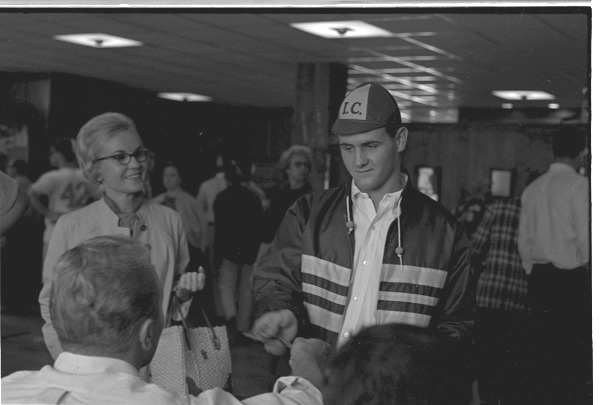 Photo credit: Ithaca College Archives
Photo credit: Ithaca College Archives
1949
The student council once again requires freshmen to wear "spuds" (small blue beanies). They had relaxed the requirement during and after the war because it didn't seem right to make GIs wear the tiny hats.
1949
Changes to the college rules allow women to stay out until midnight on Friday nights.
1950s
1950
The Ithaca College Choir broadcasts a program of Christmas carols over the CBS radio network.
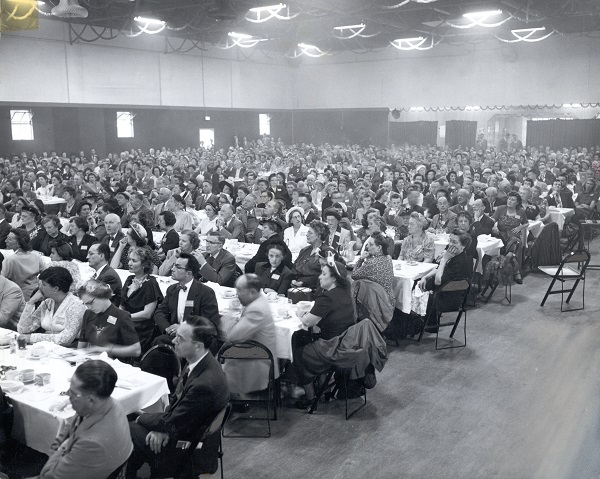 Photo credit: C. Hadley Smith
Photo credit: C. Hadley Smith
1951
The college participates in a grand celebration of the fact that the 20th century has just passed its midpoint. After months of well-organized planning, some 2,400 people converge upon Ithaca for the “Mid-Century Peace Convocation.” The theme is to “Reach the Minds and the Hearts of Men Throughout the World to Promote International understanding and World Peace.” It turns out to be a great event with many distinguished individuals participating.
1951
A series of fires damage campus buildings, including Williams Hall and the college theater. Arson is suspected.
 Photo credit: Ithaca College Archives
Photo credit: Ithaca College Archives
1952
Howard I. Dillingham issues a fundraising brochure, "Twenty-Four Pages Complete the Story." The pictures in this brochure are chosen for their shock value: cramped rooms in the downtown gyms, battered lockers, murky staircases, exposed plumbing, grimy showers, etc. Its purpose is to encourage that monetary gifts be made in order to improve the college's facilities.
1952
The college adopts a cut system where instructors determine the attendance policy for their classes.
1953
After fleeing communist forces, the college's first student from Korea, Chung Choo Oh, enrolls as a piano major.
1953
Job criticizes the New York State government for establishing the SUNY system, saying that it was done "purely for political purposes and for very little educational reason."
1954
The college "adopts" and provides financial support for a Korean War orphan.
1954
A four-year accounting program is approved by the State Education Department and Ithaca College graduates are eligible to take the C.P.A. exam.
1954
The college opens a snack bar for students to meet and grab food and drinks.
1955
The music education building is destroyed in a fire.
1955
After a failed attempt in 1953, Ithaca College and the General College become fully accredited by the Middle States Association.
1956
The General College is transformed into the College of Arts and Sciences.
1956
The Inter-Religious Conference holds its first Religious Emphasis Day at IC in order to stimulate thinking about the relationship between religion and the college.
1956
Dean of Students Earl E. Clarke escorts a summer study group to the Caribbean, a precursor to the college's study-abroad program.
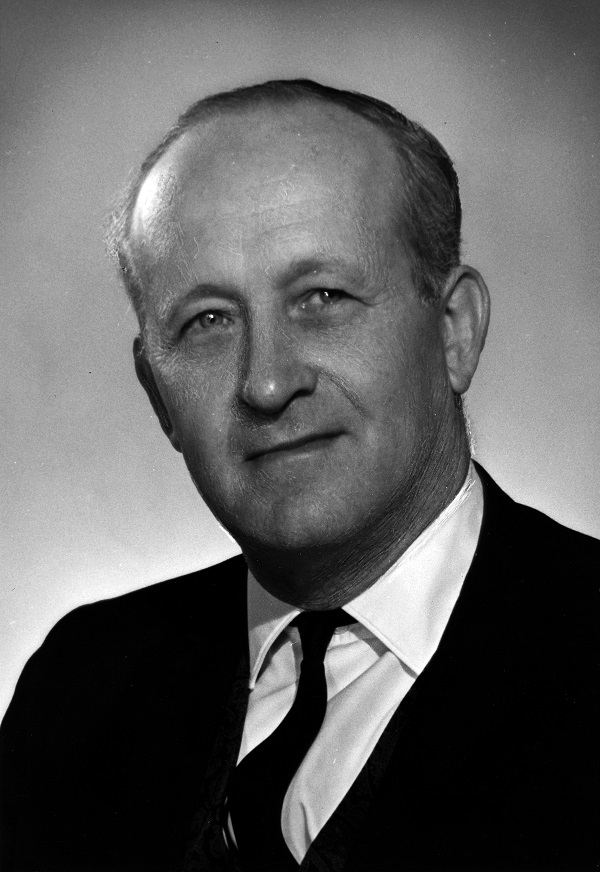 Photo credit: Ithaca College Archives
Photo credit: Ithaca College Archives
1957
Howard I. Dillingham becomes the fourth president of Ithaca College.
1957
The college has strict rules about when and where female students can wear bermuda shorts (not in class, not in the dining hall except for Friday nights and Saturdays, and certainly not on city streets on Sundays).
1957
Construction on the college radio and television studio begins.
1957
The college holds its first general Convocation.
1957
The launch of Sputnik by the Soviet Union sparks changes both in the college curriculum and on American education in general. More science and mathematics courses are added. There is a return to required courses, to core curriculum, to tougher standards, and to a more efficient approach to education at the entry level.
1957
"The Best of Broadway" debuts on WICB. The popular radio show is still on the air.
1957
The college holds its first jazz recital.
1957
WICB-AM, which would become VIC Radio, begins operations.
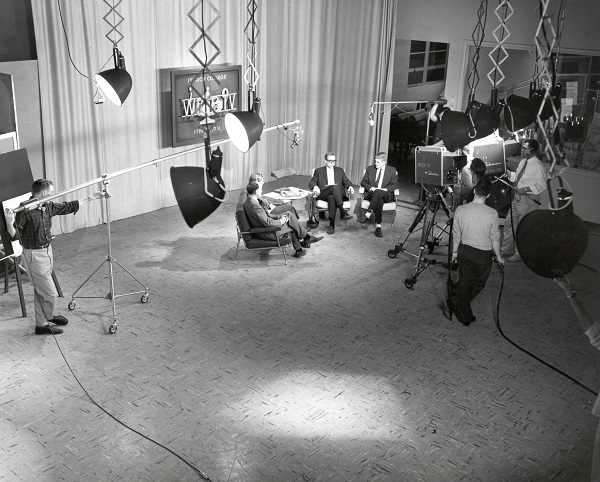 Photo credit: C. Hadley Smith
Photo credit: C. Hadley Smith
1958
WICB-TV, the forerunner to ICTV, begins broadcasting.
1958
The Friends of Ithaca College is born when college trustee Roland “Red” Fowler agrees to head a local committee to raise funds for the college's expansion.
1958
The college buys the old Tompkins County Memorial Hospital. For the first time, it can provide housing for all male freshmen.
1958
The student council passes a prohibition rule mandating that organizations holding dances or other functions on campus must name two students charged with ensuring that no alcohol is consumed.
1959
A radical change in the curriculum of the college is announced as the "Ithaca College Plan" in an article on the education page of the Sunday New York Times. Later known as the "Triplum," this new plan consists of a six-semester core in three areas: literature, history, and philosophy.
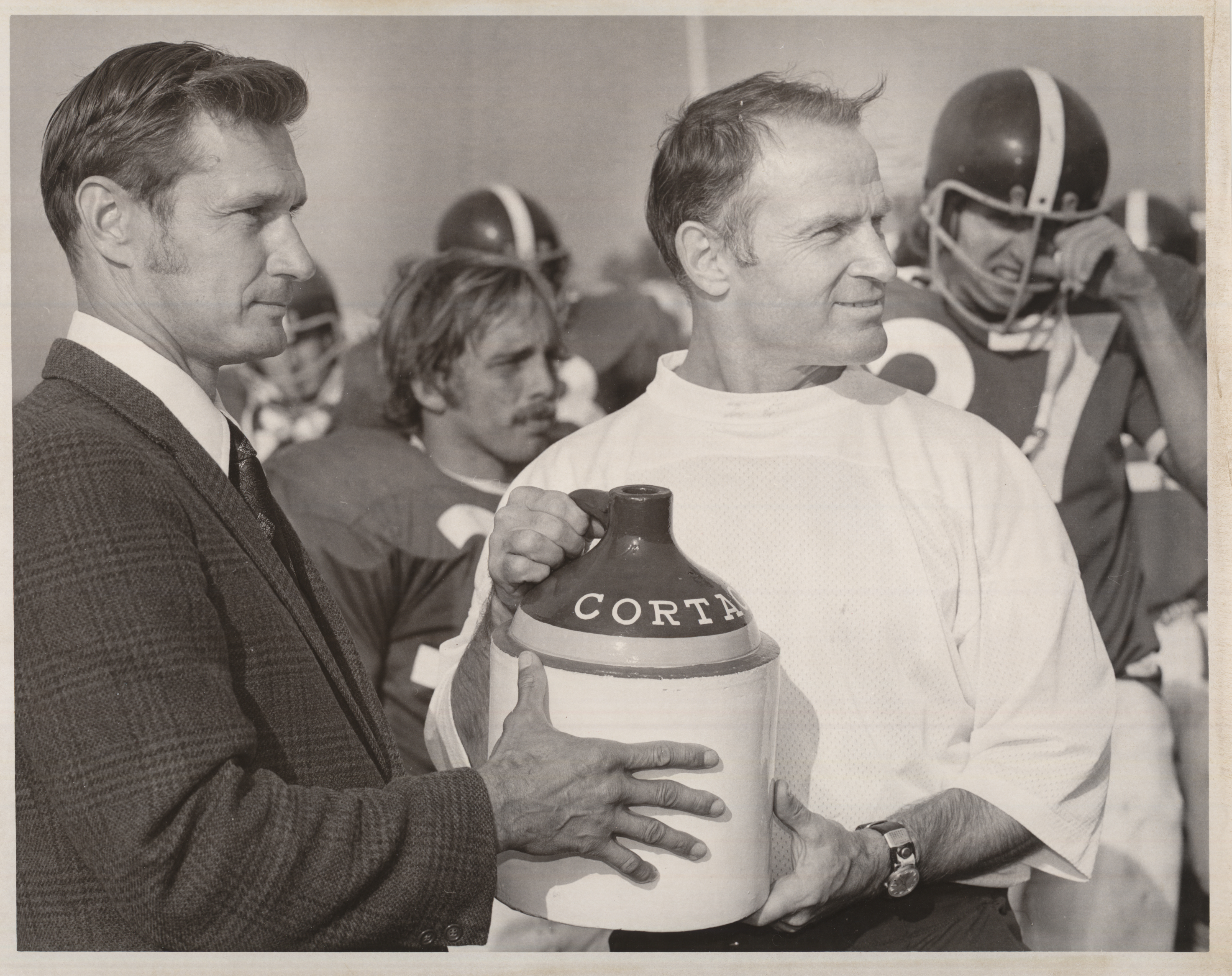 Photo credit: Ithaca College Archives
Photo credit: Ithaca College Archives
1959
The first Cortaca Jug game is played between IC and Cortland State. IC loses, but would go on to win the next year's game.
1959
Ithaca College pioneers a program to bring African students to small colleges like itself. The first two students arrive and a scholarship program is set up. The Cooperative African Scholarship goes on to flourish with funding from the federal government and private donors.
1960s
1960
The Student Union cornerstone is laid at the South Hill campus.
1960
The IC Committee Against Segregation is formed.
1960
The first parents weekend is held, with over 600 parents attending.
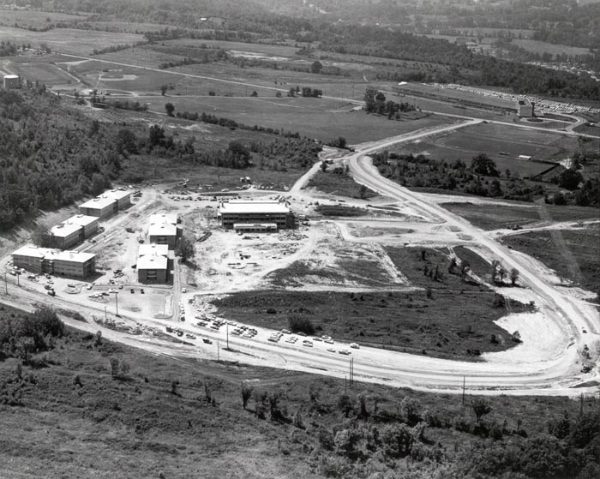 Photo credit: C. Hadley Smith
Photo credit: C. Hadley Smith
1961
The South Hill campus is officially dedicated and Convocation is held in the Union Recreation Room.
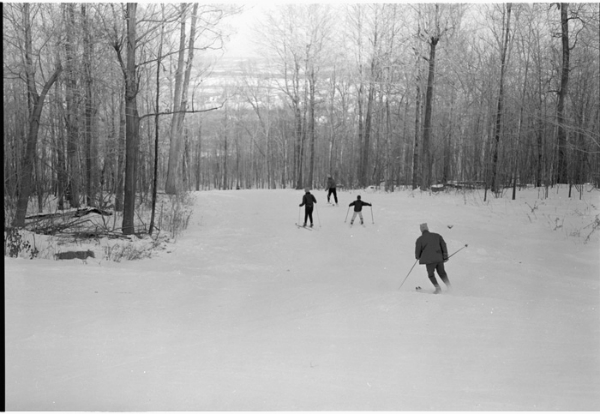 Photo credit: C. Hadley Smith
Photo credit: C. Hadley Smith
1961
Ski slopes, trails, and a skating pond are built on the South Hill campus.
1961
The Friends of Ithaca College undertake a campaign to raise $250,000 for further construction on South Hill.
 Photo credit: C. Hadley Smith
Photo credit: C. Hadley Smith
1962
The college receives $3 million in government aid to build five dorms and an infirmary.
1962
The men's baseball team advances to the second round of the college World Series.
1963
Construction of the Lower Quad is complete, with space for some 1,260 students.
1964
The new gymnasium is used for the first time in an intercollegiate basketball game.
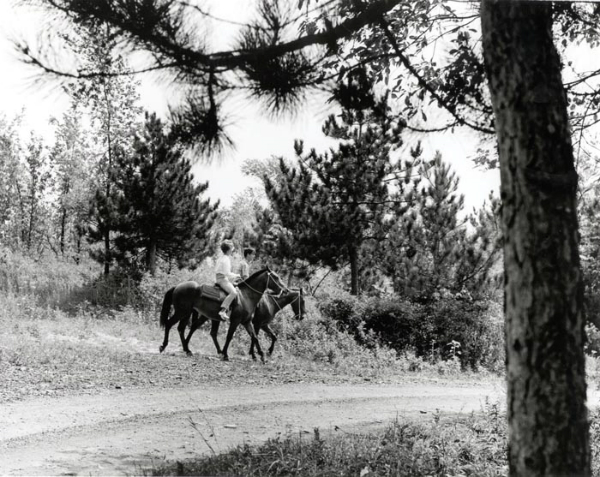 Photo credit: C. Hadley Smith
Photo credit: C. Hadley Smith
1964
Beginning in 1964 and until the early 1970s, the college kept a stable of riding horses.
1965
The Terrace Dormitories are built.
1965
The Towers are lit to display the changing year for the first time.
 Photo credit: C. Hadley Smith
Photo credit: C. Hadley Smith
1965
The baseball field is named for coach James "Bucky" Freeman, who coached the baseball team from 1931 to 1956, leading the team to four NCAA tournament appearances. He was also the second coach of the college's football team.
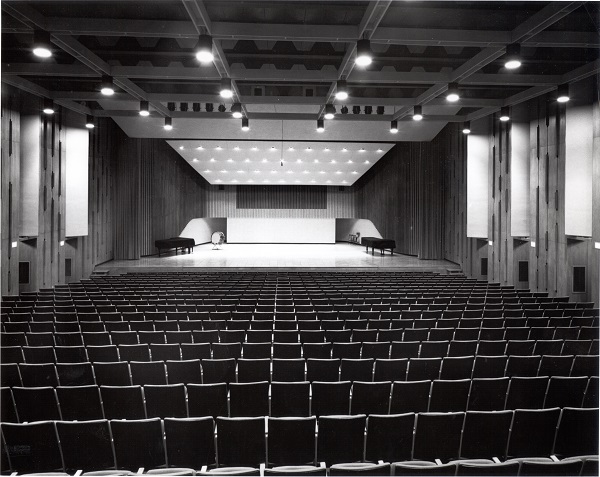 Photo credit: C. Hadley Smith
Photo credit: C. Hadley Smith
1965
The music building (eventually named Ford Hall) is dedicated.
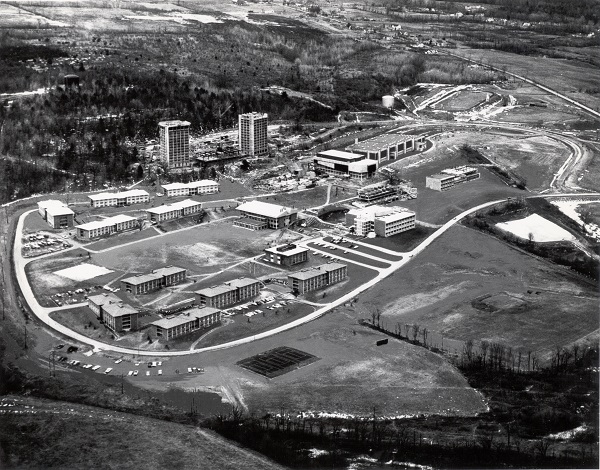 Photo credit: C. Hadley Smith
Photo credit: C. Hadley Smith
1965
Students move into the newly completed Towers. Men are housed in West Tower, women in East Tower.
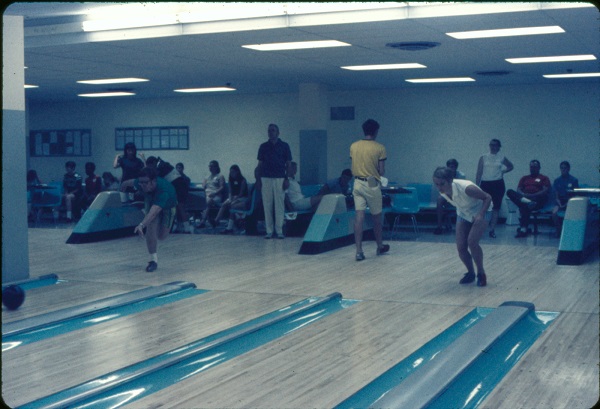 Photo credit: C. Hadley Smith
Photo credit: C. Hadley Smith
1965
Students can go bowling in the college's gymnasium.
1966
Robert M. Davies, dean of the College of Arts and Sciences, becomes the first provost of Ithaca College.
1966
The Ithaca College Museum of Art opens in the old Boardman House downtown. The museum has modern paintings on the ground floor, African and South American art upstairs, two rooms for the works of Ithaca College students, and a collection of drawings and lithographs. Dorothy Hoyt Dillingham, the president's wife, exhibits her work there.
1966
The campus ban on alcohol is relaxed to allow each fraternity to hold one official cocktail party each spring. By 1970 the campus would be wet, though drinking at sporting events was still prohibited.
1966
The African-American Student Society, which would later become the African-Latino Society, is founded to promote the social, political, economic, and educational welfare of people of color at Ithaca College.
1966
An anti-Vietnam War demonstration and march held in DeWitt Park is attended mainly by Cornell students, but the press reports that "many of the most active hecklers were from Ithaca College, and two of the speakers who took the microphone to speak against the march were from the college."
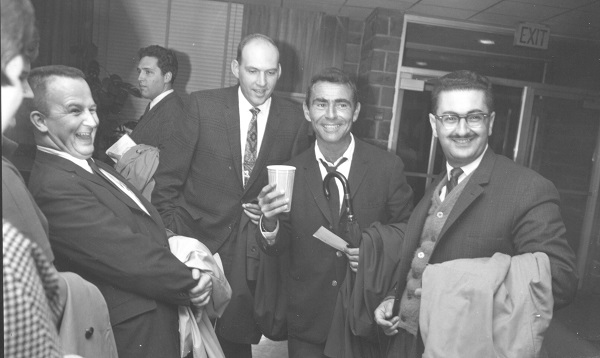 Photo credit: C. Hadley Smith
Photo credit: C. Hadley Smith
1967
"The Twilight Zone" creator Rod Serling begins teaching at the college as a visiting professor.
1967
The Ithacan produces a special issue on civil rights.
1967
For the 75th anniversary of the college, George C. Textor dedicates the campus as a whole: "Commemorating the 75th Anniversary of the Founding of Ithaca College, this campus was dedicated on October 6, 1967, to serve those who teach and learn by providing opportunities for personal fulfillment in a creative environment."
1967
As part of the 75th anniversary celebration, the IC Choir performs at the opening of the season of the American Symphony Orchestra in Carnegie Hall.
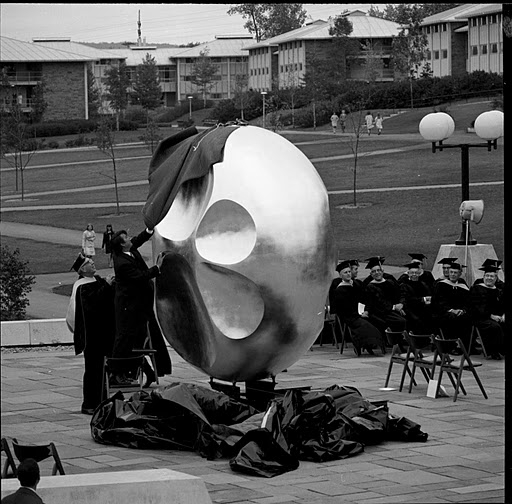 Photo credit: C. Hadley Smith
Photo credit: C. Hadley Smith
1967
Is it a fish, a ball, or nothing at all? The Textor Ball is dedicated.
1968
Students and demonstrators march and chant outside the student union following a three-day teach-in about the Vietnam War.
1968
The first organized teach-in on racism is held.
1969
A downtown motel is leased to ease overcrowding in the dorms.
1969
The board names Yavits Field in honor of Isadore "Doe" Yavits, who, until his retirement in 1963, had served for 33 years as a teacher and coach of basketball, soccer, and track and field.
 Photo credit: Ithaca College Archives
Photo credit: Ithaca College Archives
1969
The Afro-American Society and the Students for a Democratic Society burn an effigy of an unnamed college administrator during a rally. The rally protested the college’s small number of African American students and faculty and the alleged mishandling of the college’s Educational Opportunity Program finances, and advocated for the establishment of a black studies program. The rally galvanized the campus, and hard on its heels, 900 members of the IC community attended an all-day teach-in with race relations as part of its agenda.
1969
Black students criticize other Ithaca College students, saying it is impossible "to get more than 20% of the student body to participate in a demonstration."
1969
Ithaca College students are granted cuts without penalty and instructors are free to cancel classes to participate in a nation-wide demonstration against the Vietnam War. Only 500 turn out for the rally, and a mere 125 participate in canvassing the city.
1970s
1970
Some 150 students occupy the third and fourth floors of Muller Faculty Center. They issue four demands: all faculty personnel committees are to have an equal number of faculty and student members; all candidates for appointment are to respond to a student questionnaire that probes their attitudes toward students; dossiers are to contain letters of recommendation from students; and two popular professors, Beatrice Goldman and Ronald Taber, are to be rehired pending reevaluation under these new rules.
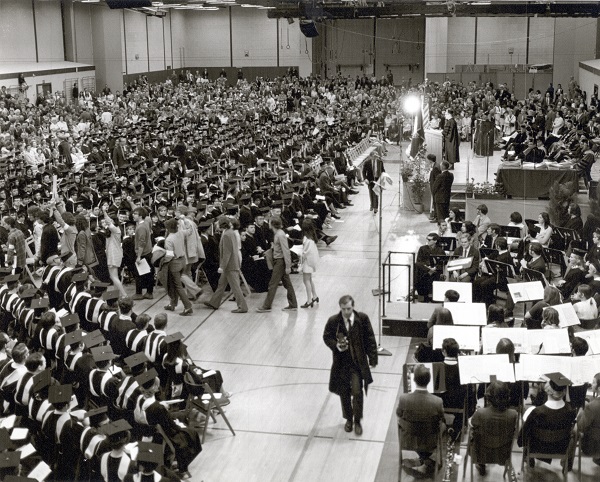 Photo credit: C. Hadley Smith
Photo credit: C. Hadley Smith
1970
About 200 people — students, faculty members, a few parents, and one member of the administration — walk out of Commencement in protest during Nelson A. Rockefeller's speech. The protesters march to the recreation room in Egbert Union, where they hold "The First Annual Ithaca College [Alternate] Commencement." The ceremony is designed as a protest against Rockefeller and as an expression of "repulsion and disgust for the values celebrated at the traditional ceremony."
1970
Dillingham is named president emeritus after resigning in August.
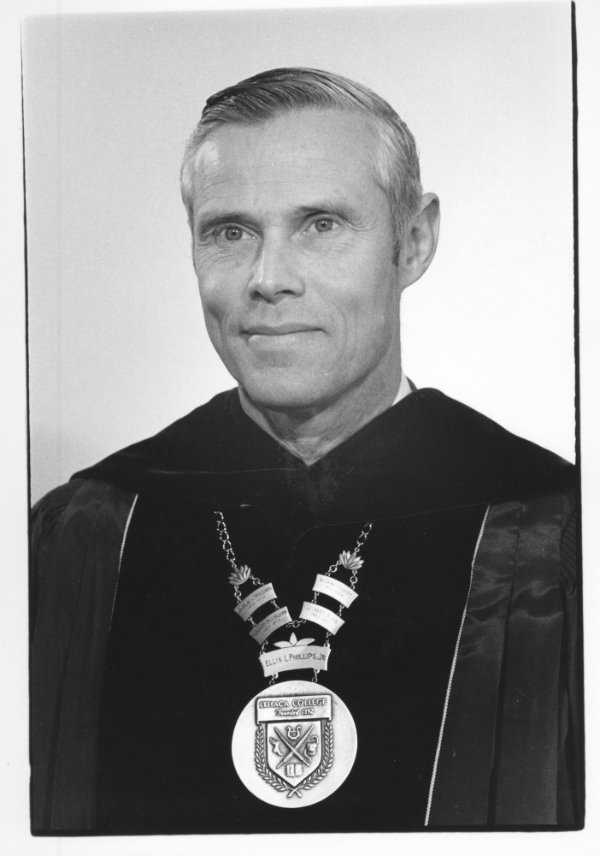 Photo credit: Unknown
Photo credit: Unknown
1970
Ellis L. Philips, Jr. is named the fifth president of IC.
1970
The bylaws of the college are amended to allow the election of two students, two faculty, and two alumni to the board of trustees. After a heated debate, full voting rights would be given to student and faculty trustees in 1972.
1971
The board of trustees approves a reorganization of the college proposed by a committee of administrators, faculty, and students. The college is now comprised of the School of Humanities & Sciences, School of Health Professions, School of Music, Center of Individual and Interdisciplinary Studies, Division of Communications, and Division of Business Administration.
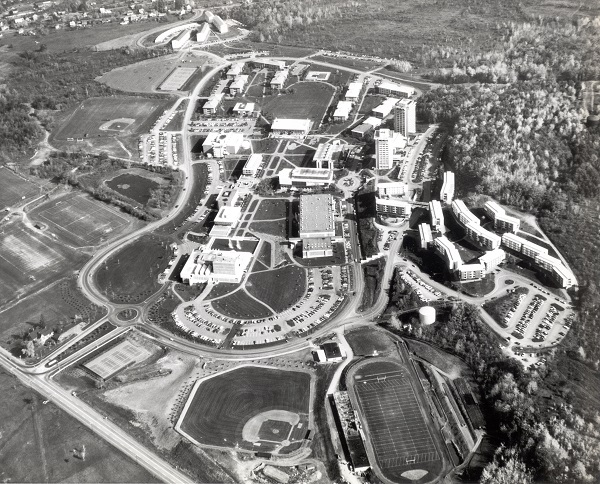 Photo credit: C. Hadley Smith
Photo credit: C. Hadley Smith
1971
Students move into the newly completed Garden Apartments.
1972
Ithaca College establishes a London Center in a townhouse in South Kensington. Under Director Edward Vincent, its offerings rapidly expand to include programs in many of the divisions of the college.
1972
After much debate, the board of trustees approves a governance plan, creating a student council, staff council, faculty council, administrative council, and community council. "By recommending a council form of governance we are recommending that normally college policies shall be developed by groups, but that the final responsibility and authority shall rest with the administrators of the college."
1972
Provost Robert Davies resigns at the request of the president. This touches off faculty protests and intensifies demands for a greater faculty role in decisions relating to high-level administrators.
1972
It is discovered that there is not enough money to get through the year. A one-day meeting of all concerned administrators is called and it is agreed that all college budgets be cut back by a set percentage.
1973
The School of Communications is founded.
1974
The college is almost forced to close for the spring semester after the transformer supplying electricity to campus suddenly fails in late March. Luckily, an alternate transformer is unexpectedly located within a few days.
1974
A graduate degree in communications is authorized and the first color television cameras are purchased.
 Photo credit: Ithaca College Archives
Photo credit: Ithaca College Archives
1975
James J. Whalen becomes the sixth president of Ithaca College after President Philips resigns due to an illness in his immediate family.
1975
The music department hires its first woman conductor, Pamela Gearhart.
1975
In one of the few times the college's student handbook is written by students, it includes a vivid description of the college's drug scene and a hand-drawn map to a local brothel.
1978
Students and faculty join the anti-Apartheid movement by calling for the college to divest from corporations active in South Africa.
1978
Ithaca College begins recycling some of its paper trash.
1978
The college's faculty votes to unionize. However, the National Labor Relations Board would ultimately declare them ineligible to organize after a 1980 Supreme Court ruling limiting the ability of college faculty to unionize.
1978
After complaints that people of color were being ostracized from the basketball team, the African-Latino Society hosts the first annual Builders of a Better Brotherhood basketball tournament and cultural day for students, alumni, Ithaca residents, and others interested in cultural diversity at the college.
1979
The football team defeats Wittenberg University 14-10 to win its first NCAA Division III national championship.
1979
After a series of student rallies, the board of trustees amends the Student Conduct Code to disallow discrimination on the basis of political affiliation or sexual orientation.
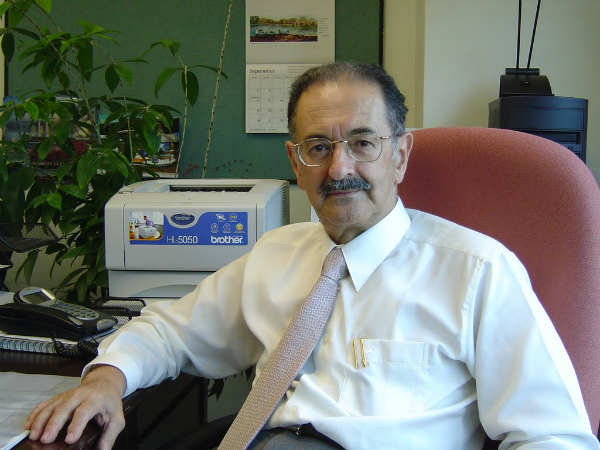 Photo credit: Unknown
Photo credit: Unknown
1979
John Keshishoglou, professor and dean of the Park School of Communications, becomes the first Ithaca College professor to be named a Fulbright Scholar. He spends the year researching communications and advising the Greek Ministry of Education on implementation of plans for educational television.
1979
Seven students are expelled and four are suspended for masquerading as members of the Ku Klux Klan on Halloween.
1980s
1980
Freshman Joseph P. Parella dies of hyperthermia after taking part in a Delta Kappa fraternity hazing initiation involving strenuous exercise. The fraternity was given a three-year suspension from campus as a result.
1980
The college organizes a committee to implement racial awareness workshops.
1980
The college (unsuccessfuly) files a libel suit against the Yale Daily News for publishing an underground college guide that reports that "sex, drugs and booze are the staples of life" at IC, and that "the use of pot is a foregone conclusion."
1981
Strict enforcement of fire codes limits the number of students spending weekend nights in downtown bars like The Dugout and The Pine Tavern.
1981
The college opts to get rid of fall break in lieu of a longer Thanksgiving break because students were skipping classes beforehand. The change would last two years.
 Photo credit: Bill Truslow
Photo credit: Bill Truslow
1982
The Student Computer Center offers a VAX dial-up service to connect personal computers.
1983
Record enrollment stretches campus housing to its limit, with some rooms converted to triples or six-student rooms. Construction of a new dormitory begins.
1985
Students mourn as the state drinking age is raised to 21.
1985
The college bookstore bans Cliff's Notes as a result of complaints from the English department.
1985
Students in Ad Lab participate in a nationwide competition sponsored by the American Advertising Federation, placing fourth.
1985
A new campus magazine, The Leading Edge, is created.
1985
A student causes controversy when he claims to have written the lyrics to Bryan Adams' "Summer of '69" during an ICB-TV interview.
1986
Twenty-five-year-old public safety officer William Chapin dies while trying to rescue a Cornell University student who had fallen into a gorge at Buttermilk Falls.
1986
A performance of scenes from Douglas Ward's play, "A Day of Absence," provokes discussions about racism on campus.
1986
VIC Radio holds its first 50-hour fundraising marathon.
1987
Construction of the new IC Pub is completed.
1987
To combat HIV, the college installs condom-dispensing machines in dorms.
1987
The college changes its investment policy to ensure that if it does invest in South Africa-related companies, they are companies that treat black South Africans fairly.
1988
The IC Gay and Lesbian Alliance (GALA) holds its first Blue Jeans Day to raise awareness of gay and lesbian issues.
1988
The IC football team wins its second national championship.
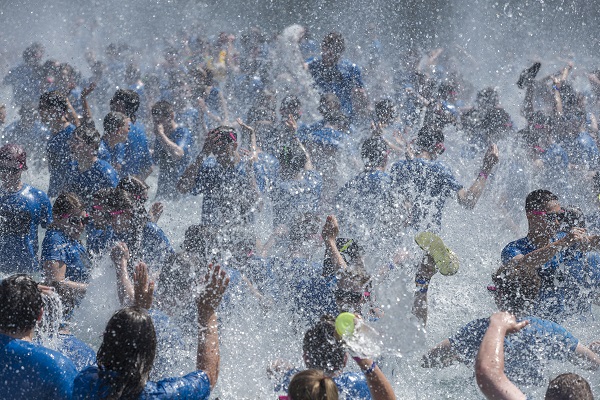 Photo credit: Adam Baker
Photo credit: Adam Baker
1989
Seniors begin the tradition of jumping into the Dillingham fountains to celebrate the end of their time at the college.
1989
The college wrestling team wins the first of back-to-back national titles.
1989
Students hold a "red tape" rally to protest against the college's bureaucracy.
1989
The School of Communications is named after media magnate Roy H. Park, a philanthropist and longtime member of the college's board of trustees.
1990s
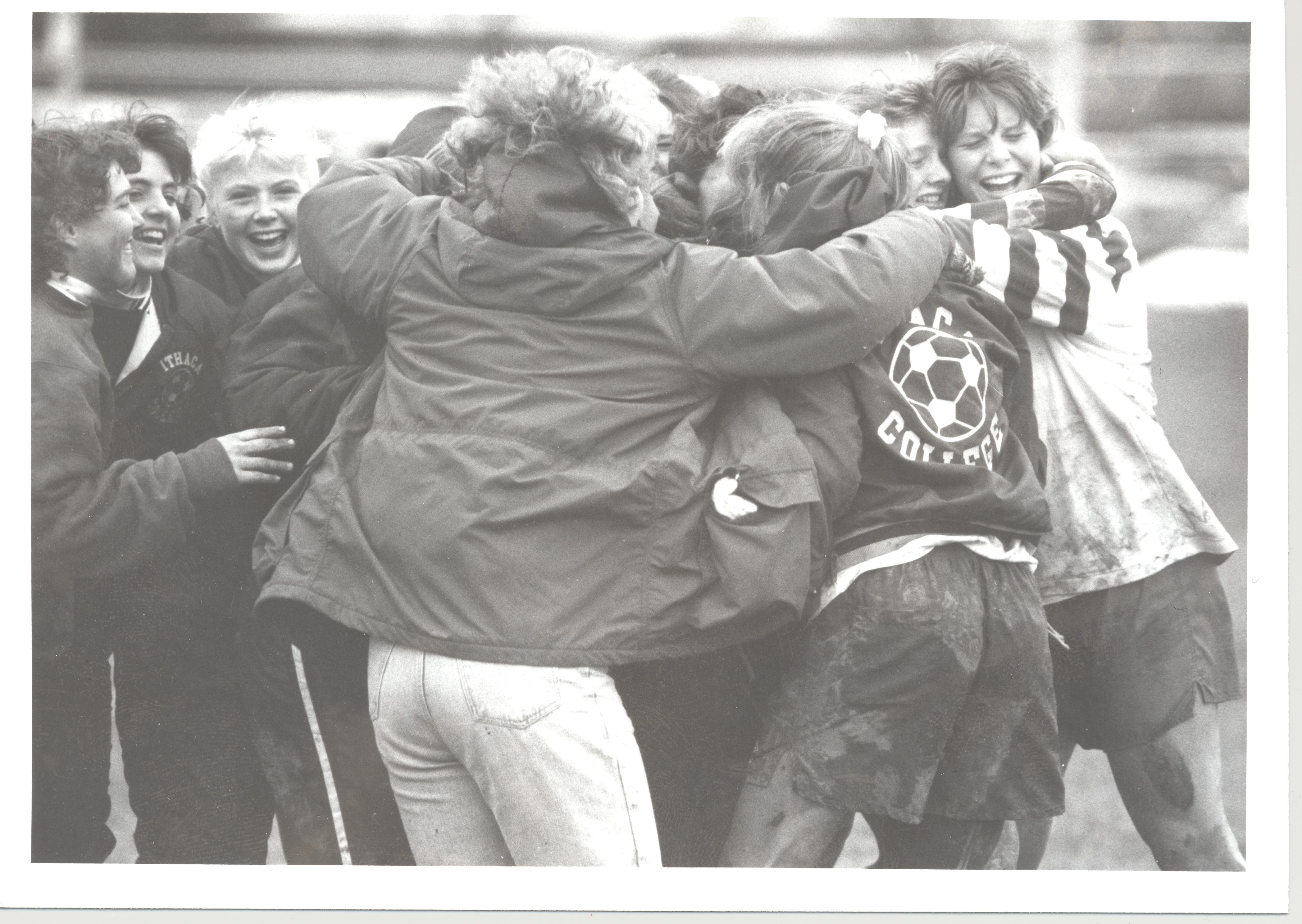 Photo credit: Ithaca College Archives
Photo credit: Ithaca College Archives
1990
GOOOOOAAAAAALLLLLLLLLLL!!!!!!!! The women's soccer team wins the first of back-to-back national championships.
1990
The college bans public, indoor smoking.
1990
Over 75 students are arrested by Ithaca city police in a crackdown on disruptive parties.
1990
Students hold rallies both against and in support of the First Gulf War.
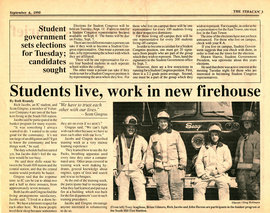 Photo credit: The Ithacan
Photo credit: The Ithacan
1990
Students volunteer with the local fire department and live in the newly built South Hill firehouse.
1990
IC institutes a set of regulations governing Greek organizations' recognition by the college. Subsequently, the college stops recognizing social and service fraternities and sororities.
1991
IC football wins its third national championship.
1991
The physical therapy program moves its senior year program from the Bronx to Rochester.
 Photo credit: Adam Baker
Photo credit: Adam Baker
1991
The college hosts its first Educational Technology Day, bringing tech experts and vendors to campus to highlight the newest trends in educational technology.
1992
The Office of Minority Affairs is created to promote multiculturalism at the college.
1992
The Ithaca College Gerontology Institute is established.
 Photo credit: Unknown
Photo credit: Unknown
1993
The college approves the creation of the Los Angeles Program, allowing students to spend a semester learning and working in Hollywood.
1993
The internet arrives at Ithaca College. Thanks to funding from the John von Neumann Network, any computer connected to the IC ethernet network can access the World Wide Web.
1993
Despite its popularity among students, the college bans rollerblading in pedestrian traffic areas due to safety concerns.
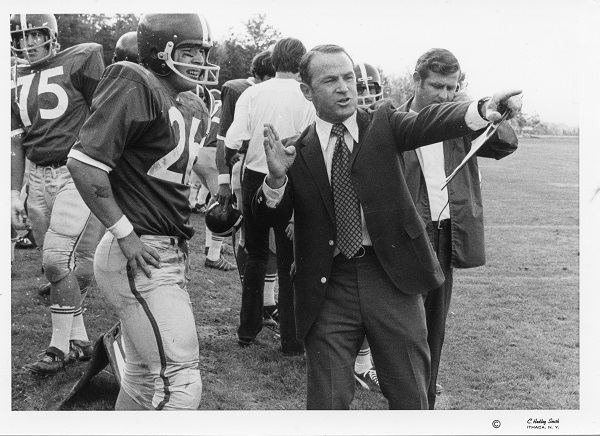 Photo credit: C. Hadley Smith
Photo credit: C. Hadley Smith
1994
Football coach Jim Butterfield retires after 27 years, 206 victories, and three national titles.
1994
Falling enrollment leads to college downsizing. By the 1997-1998 school year, over 200 positions would be cut, as well as athletics programs like varsity golf.
1995
Pro*fusion, a biannual feminist journal for creative writing and artwork, is founded.
1995
Condom machines are removed from dorms. Condoms can instead be purchased in regular vending machines.
1995
After complaints from 12 resident directors to the Tompkins County Human Rights Commission, the college's board of trustees votes to extend full benefits to the partners of employees in same-sex relationships.
1995
Due to higher-than-expected enrollment, the college rents space from the then independently owned College Circle apartment complex to use for student housing.
 Photo credit: John Clisham
Photo credit: John Clisham
1995
The Center for Trading and Analysis of Financial Instruments is founded.
1996
Holocaust survivor Elie Wiesel silences the crowd with a poignant speech at the 101st Commencement ceremony.
1997
All residence halls are connected to the college's computer network, allowing students to access the internet from their dorm rooms.
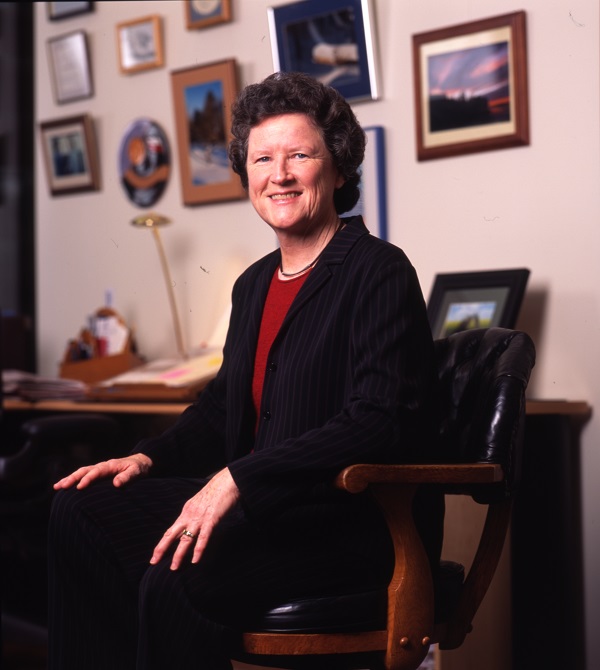 Photo credit: Mark McCarty
Photo credit: Mark McCarty
1997
Peggy Ryan Williams begins her tenure as Ithaca College's seventh president, the first woman to hold the position.
1997
The college puts recycling bins in every dorm room.
1997
The college forms a partnership with the Frederick Douglass Academy in Harlem. The arrangement allows IC education students to gain teaching experience in an urban setting. Students from the Frederick Douglass Academy take summer courses at IC and participate in specially designed workshops.
1997
The first James J. Whalen Academic Symposium is held, giving students the opportunity to present their academic work and research.
1997
The Jumpstart program is founded, helping to ease first-year and transfer students' transition into the Ithaca experience through activities ranging from service projects with local organizations to exploring regional sustainability programs and operations.
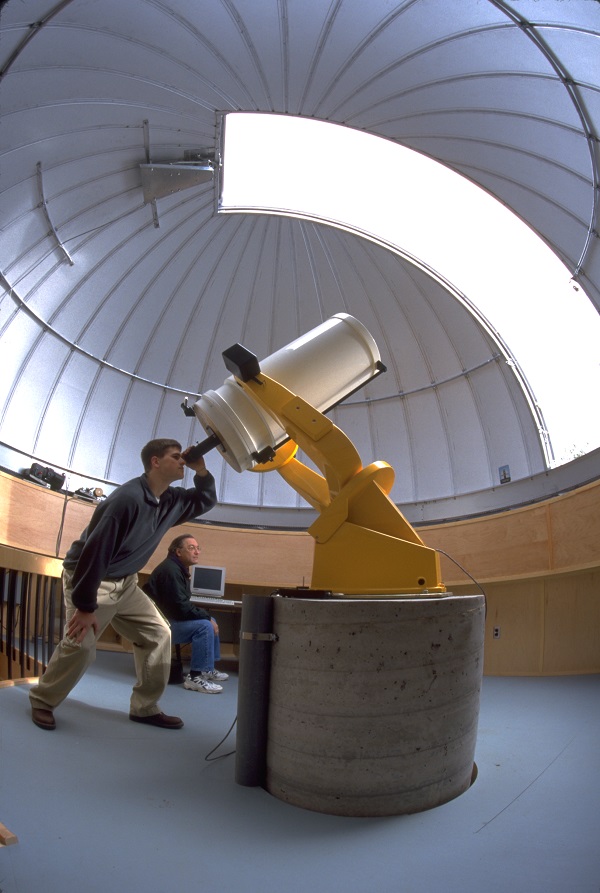 Photo credit: David Ruether
Photo credit: David Ruether
1998
The Clinton B. Ford Telescope Observatory is built, allowing students and faculty to better study the cosmos.
1998
The first Day of Service is held, enabling students to give back to the local community through volunteer efforts.
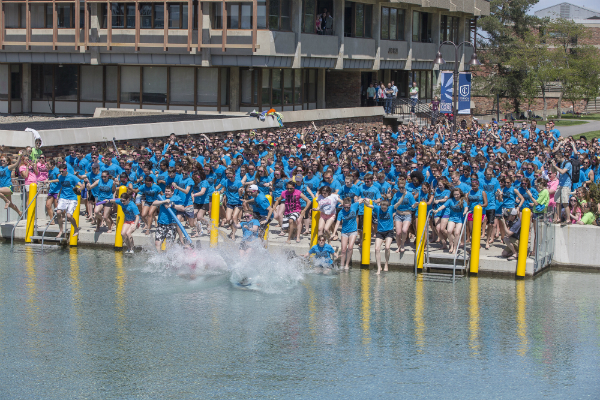 Photo credit: Adam Baker
Photo credit: Adam Baker
1998
The college takes a number of steps to make the fountain jump safer, including distributing T-shirts to distinguish seniors from others and setting up a medical tent nearby.
1999
The college enters into a partnership with Longview, an assisted-living facility for senior citizens. The partnership enables IC students to participate in extensive intergenerational programming.
1999
The Fitness Center is completed.
1999
The Center for the Study of Culture, Race, and Ethnicity is founded.
1999
Poet Maya Angelou delivers the Commencement address.
1999
Buzzsaw Haircut, an independent monthly alternative magazine, is founded.
1999
Cortaca ends in brawls between fans after Cortland fans rush the Butterfield Stadium field in victory.
2000s
2000
The fountain jump is moved to Senior Week in an effort to limit student injuries and property damage.
2001
The IC community holds a candlight vigil in the wake of the Sept. 11 attacks. In the weeks after the attacks, many in the community made donations to the Disaster Relief Fund and Red Cross.
2001
The college finalizes a deal to lease the College Circle Apartments for on-campus housing.
2001
The Center for LGBT Education, Outreach, and Services opens its doors, providing a resource center on campus dedicated to the needs of the LGBTQ community and their allies.
2002
The Martin Luther King Scholar Program is established for talented students from ethnic and racial backgrounds that have been historically underrepresented in higher education.
 Photo credit: Krystal Cannon
Photo credit: Krystal Cannon
2004
The Ithaca College Natural Lands are designated as a nature preserve.
2004
Women's crew wins the first of back-to-back national championships.
2005
After Hurricane Katrina hits New Orleans, the college offers enrollment opportunities to New York State residents who were attending colleges in the affected area of the country. Student organizations pull together a campus-wide drive to raise money for the national relief effort.
2005
The college begins sponsoring the Finger Lakes Environmental Film Festival.
2006
For the 10th year in a row, Ithaca College is ranked as one of the top 10 "Best Master's Universities by Region" by the U.S. News and World Report.
2007
Ithaca College signs the American College and University Presidents Climate Commitment, pledging to follow a set of timetables in an effort to reduce and ultimately eliminate campus greenhouse emissions.
 Photo credit: Sheryl D. Sinkow
Photo credit: Sheryl D. Sinkow
2007
The Dalai Lama visits Ithaca College and speaks before a sold-out crowd in Ben Light Gymnasium.
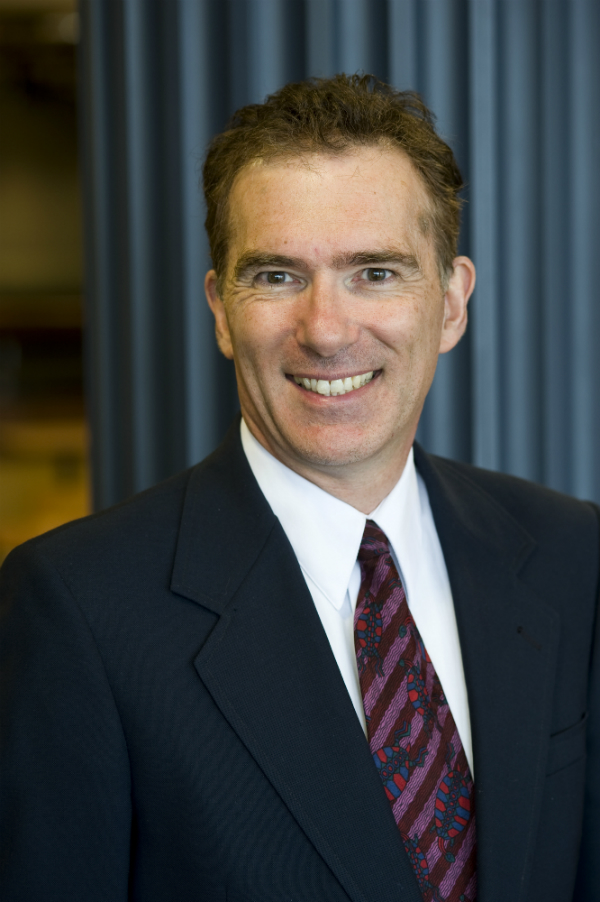 Photo credit: Sheryl D. Sinkow
Photo credit: Sheryl D. Sinkow
2008
President Peggy Ryan Williams retires and Tom Rochon becomes Ithaca College's eighth president.
2008
The Dorothy D. and Roy H. Park Center for Business and Sustainable Enterprise, a LEED platinum certified building, opens.
2009
The college's Office of Student Engagement starts the Service Saturdays Program, which provides volunteer opportunities for students to help in the Ithaca community.
2009
The first Izzy Awards, honoring outstanding achievement in independent media, are held by the Park Center for Independent Media.
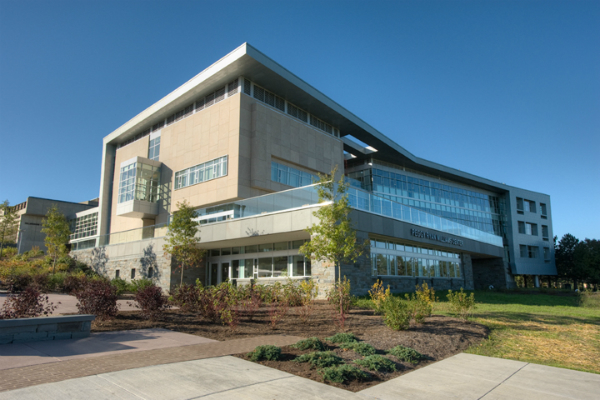 Photo credit: Bill Truslow
Photo credit: Bill Truslow
2009
The Peggy Ryan Williams Center, built to LEED platinum environmental certifications, opens.
2010s
2010
The college purchases the Circle Apartments.
 Photo credit: Unknown
Photo credit: Unknown
2011
The college moves to select a mascot. Of three finalists — a phoenix, a lake beast, and a flying squirrel — none are chosen due to an overall negative response.
2011
After demonstrations from IC students and local residents, Sodexo dining hall employees are given a raise to a living wage.
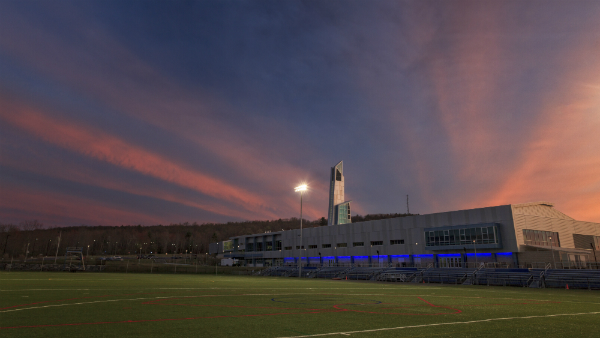 Photo credit: Adam Baker
Photo credit: Adam Baker
2011
The Athletics and Events Center opens.
2012
Alumna Meghan Musnicki '05 wins a gold medal in rowing at the 2012 Summer Olympics. She would go on to win a second gold at the 2016 Olympic Games.
2012
Ithaca is named the best college town in the U.S. by the American Institute for Economic Research.
2012
The college begins its ICNYC program, giving students the opportunity to live, work, and learn in New York City.
2012
The college begins a pilot program to provide iPads for faculty to use as teaching tools.
2013
May I have this dance? The first intergenerational prom is held, bringing together college students and senior citizens for a night of fox-trotting.
2013
Freshmen begin taking core classes in different thematic areas, the first step in implementing the college's Integrative Core Curriculum. The themes include “Identities;” “Inquiry, Imagination and Innovation;” “Mind, Body, Spirit;” “Power and Justice;” “The Quest for a Sustainable Future;” and “A World of Systems.”
2014
Ithaca College, Cornell University, and Tompkins Cortland Community College collaborate to start a local business incubator, Rev: Ithaca Startup Works.
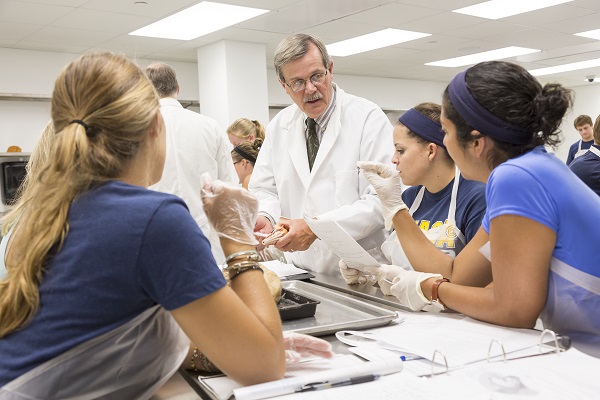 Photo credit: Adam Baker
Photo credit: Adam Baker
2014
The physical therapy graduate program moves to the Ithaca College campus from Rochester. On the South Hill campus, the new Human Anatomy Lab is founded, giving health sciences students an opportunity to increase their understanding of the human body and how it works.
2014
Students demonstrate in support of the Black Lives Matter movement after a number of high-profile police shootings around the country. They call on the college to acknowledge and address systemic oppression on campus.
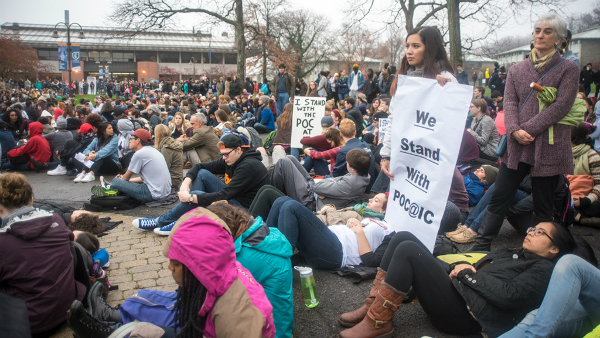 Photo credit: Amanda den Hartog/The Ithacan
Photo credit: Amanda den Hartog/The Ithacan
2015
A string of racially charged incidents sparks widespread demonstrations calling on the college to do more to provide a safe and inclusive environment for students of color. Students and faculty vote "no confidence" in President Tom Rochon.
2016
President Tom Rochon announces his retirement, effective in 2017.
2016
The college introduces coed dorm rooms.
2016
The college begins getting the equivalent of 10 percent of its annual electricity from a solar power farm.
2016
The Wall Street Journal and Times Higher Education rank IC #13 in the nation for student engagement — a measure of teaching quality that considers how well the college manages to inform, inspire, and challenge its students.
2017
Ithaca College celebrates the 125th anniversary of its founding.
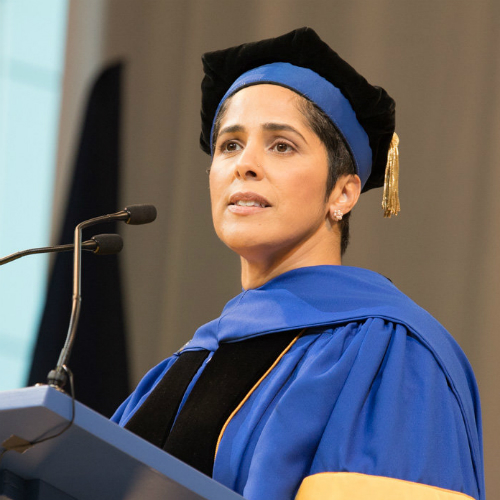 Photo credit: Sheryl Sinkow
Photo credit: Sheryl Sinkow
2017
Shirley M. Collado becomes Ithaca College's ninth president.
2017
The college is named a top producer of students and faculty receiving Fulbrights by the Fulbright Program.

